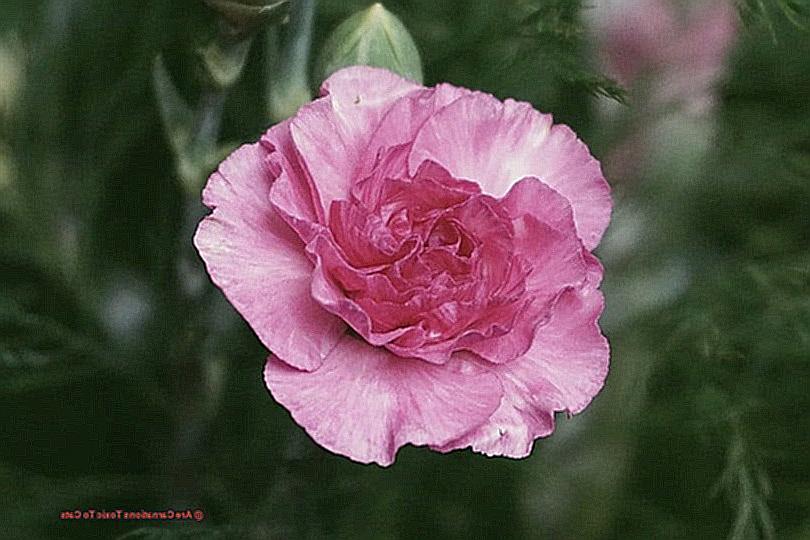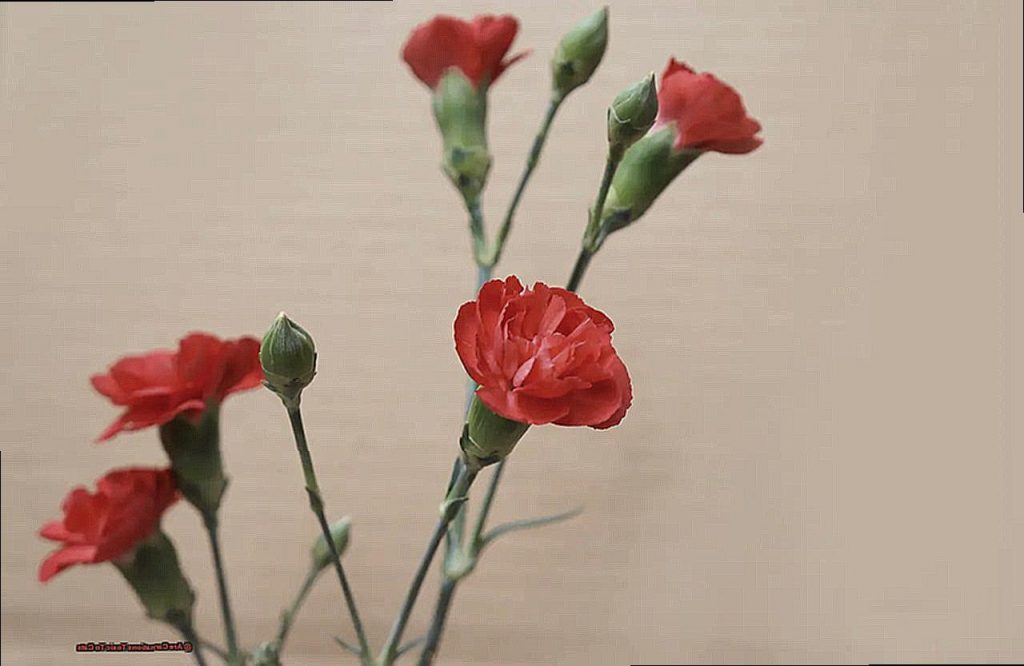Let’s talk about a topic that may not have crossed your mind before – the potential toxicity of carnations to cats. These delicate flowers may seem harmless, but they can actually be dangerous for our feline companions.
As much as we love to spruce up our homes with floral arrangements, it’s crucial to consider the safety of our furry family members. So, buckle up and join us as we explore why these pretty petals may not be the best choice for cat-friendly households.
Let’s get right into it.
Are Carnations Toxic To Cats?
Contents
Carnations are beautiful flowers that are loved by many for their long-lasting blooms and sweet fragrance. However, for cat owners, there may be a concern about whether or not these flowers are safe for their feline friends. As an expert on this topic, I’m here to provide some insight into the potential dangers of carnations to cats and tips for keeping your pets safe.
First and foremost, it’s important to note that while carnations may not be considered toxic to cats, they can still pose a danger if ingested or come into contact with. The stems and leaves of these flowers contain saponins and glycosides, which can cause gastrointestinal upset in cats. This can lead to symptoms such as vomiting, diarrhea, and excessive salivation. Additionally, the petals of carnations contain a substance called dianthramine which can cause mild skin irritation if a cat comes into contact with it.
So what can cat owners do to keep their pets safe from the potential dangers of carnations? Here are some tips to consider:
- Keep carnations out of your cat’s reach: If you have a curious cat who loves to nibble on plants, it’s best to avoid having carnations in your home or garden. This will prevent any potential ingestion or contact with the plant.
- Monitor your cat closely: If you do have carnations in your home, make sure to keep a close eye on your cat. If they show any signs of discomfort or illness after coming into contact with the plant, it’s best to remove it from their reach and seek veterinary care if necessary.
- Be cautious of pesticides and chemicals: When purchasing carnations, make sure to buy them from a reputable source and avoid using any chemicals on them if you have cats in your home. These substances can be harmful if ingested by your furry friend.
- Know the difference between toxicity levels: It’s important to note that different types of carnations may have varying levels of toxicity for cats. While the common garden variety is more toxic, the miniature variety is considered to be less harmful. It’s always best to err on the side of caution and keep all types of carnations away from your cat.

The Chemical Composition of Carnations and Its Effects on Cats
Carnations, with their vibrant colors and delicate petals, are a staple in many bouquets and floral arrangements. But did you know that these seemingly harmless flowers could pose a threat to your feline friends? As an expert on the topic of “The Chemical Composition of Carnations and Its Effects on Cats,” I am here to inform you about the potential dangers of carnations for cats.
Saponins: A Risky Ingredient
Carnations contain saponins, a type of chemical compound that is toxic to cats. These substances can cause gastrointestinal upset, resulting in vomiting and diarrhea. As cats are known to be curious creatures, they may be tempted to nibble on these flowers, putting them at risk of ingesting saponins.
Essential Oils: Not So Essential for Cats
In addition to saponins, carnations also contain essential oils such as eugenol and linalool. While these oils give the flowers their pleasant scent, they can be harmful to cats if ingested in large amounts. These oils can cause irritation to the mouth, throat, and digestive tract of cats, leading to discomfort and potential health issues.
Cyanogenic Glycosides: A Deadly Compound
Another potentially toxic compound found in carnations is cyanogenic glycosides. These compounds can release cyanide when broken down by the digestive system, causing symptoms such as difficulty breathing and weakness in cats. This is especially dangerous for cats who may have a limited ability to metabolize such substances.
Why Cats are at Risk
Cats are particularly sensitive to the chemicals found in carnations due to their small body size and unique metabolism. Even a small amount of ingestion can result in serious health issues for our feline friends. This is why it is crucial for cat owners to be aware of these potential dangers and take necessary precautions.
Tips to Keep Your Cat Safe
As a cat owner, it is vital to be proactive in protecting your furry companion from potential hazards. Here are some tips to keep your cat safe from the dangers of carnations:
Signs and Symptoms of Carnation Toxicity in Cats
Carnations are a popular flower often used in bouquets and home decor. They come in a variety of colors and have a lovely, delicate appearance. While they may seem harmless to us, they can actually be toxic to our feline friends. As an expert on the topic of carnation toxicity in cats, I want to share with you the signs and symptoms to look out for to keep your cat safe.
What makes carnations toxic to cats? These beautiful flowers contain a compound called saponin, which is found in all parts of the plant – leaves, stems, flowers, and even the water in a vase containing carnations. This compound can cause a range of symptoms in cats when ingested, from mild irritation to more severe health issues.
So, what are the signs and symptoms of carnation toxicity in cats? The most common ones include vomiting and diarrhea, which can occur within hours of ingestion. You may also notice your cat drooling excessively or refusing to eat due to stomach discomfort or nausea. Lethargy and difficulty breathing can also occur if the toxin is not addressed promptly. Additionally, direct contact with saponin can cause skin irritation, leading to redness around the mouth and paws.
If you suspect your cat has ingested carnations or is showing any of these symptoms, it is crucial to seek veterinary care immediately. Even if the symptoms seem mild, it is better to err on the side of caution and have your cat checked by a professional. Your veterinarian may perform a physical examination and ask for information about the ingestion of carnations to confirm the diagnosis.
Treatment for carnation toxicity may include inducing vomiting to remove any remaining plant material from the stomach and administering activated charcoal to absorb any toxins in the digestive tract. In severe cases, your cat may need to stay in the hospital for supportive care such as IV fluids and medication to manage symptoms.
What to Do If Your Cat Ingests Carnations
Carnations are beautiful and popular flowers, often used in bouquets and floral arrangements. As a cat owner, you may be wondering if these flowers are safe for your feline friend. While they are considered non-toxic to cats, it is important to be aware of the potential risks and know what to do if your cat ingests carnations.
In this blog post, we will discuss the necessary steps to take if your cat has ingested carnations. As an expert on the topic, I have gathered research and personal experiences to provide you with valuable insights and advice.
Observe Your Cat’s Behavior and Symptoms
The first thing to do if you suspect your cat has ingested carnations is to observe their behavior and symptoms. Some cats may not show any adverse reactions, while others may experience discomfort or illness. Keep an eye out for symptoms such as vomiting, diarrhea, drooling, and difficulty breathing.
If your cat is showing signs of distress or discomfort, it is best to contact your veterinarian immediately. They will be able to assess the situation and recommend the next course of action.
Seek Veterinary Attention
If your cat is showing any symptoms or is in distress, it is essential to seek veterinary attention right away. While carnations are considered mildly toxic to cats, ingestion can still cause irritation or discomfort. Your vet may recommend inducing vomiting or administering activated charcoal to help absorb any remaining toxins in your cat’s system.
Monitor Your Cat Closely
Even if your cat is not showing any immediate symptoms after ingesting carnations, it is essential to keep a close eye on them for the next 24 hours. Symptoms may not appear right away, so it is crucial to monitor them closely. If you notice any changes in their behavior or health, contact your veterinarian immediately.
Prevent Further Absorption of Toxins
If the ingestion was recent and your cat is not showing any symptoms, you can try to prevent further absorption of toxins by giving them a small meal. This will help to dilute their stomach contents and may reduce any potential harm from the carnations.
Keep Carnations Out of Reach
To prevent future incidents, it is best to keep carnations out of reach of cats and other pets. This includes not displaying them in vases or floral arrangements that can easily be knocked over or accessed by curious pets. Remember that even though carnations are considered non-toxic to cats, they can still cause gastrointestinal upset if ingested in large quantities.
Consider Alternatives
If you are a cat owner who enjoys having fresh flowers in your home, consider choosing non-toxic alternatives such as roses, sunflowers, or snapdragons. It is always better to err on the side of caution when it comes to the health and well-being of our furry friends.
Alternatives to Carnations for Cat-Friendly Flower Arrangements
Are you a flower lover with a feline friend at home? As much as we love to brighten up our homes with beautiful flower arrangements, it is important to consider the safety of our furry companions. In this blog post, I will be sharing valuable insights and recommendations for pet owners looking for alternatives to carnations in their cat-friendly flower arrangements.
Why Choose Alternatives to Carnations?
Carnations are a popular choice for flower arrangements due to their vibrant colors and long-lasting blooms. However, these seemingly harmless flowers can actually be toxic to cats. Carnations contain a compound called saponin, which can cause gastrointestinal upset, vomiting, and diarrhea in cats when ingested. As responsible pet owners, it is our duty to keep our cats safe and healthy by finding safe alternatives to carnations.
Safe Alternatives to Carnations
- Spider Plant – Not only is this plant safe for cats, but it also acts as a natural air purifier. Its long, green and white leaves make for a beautiful addition to any flower arrangement.
- African Violet – This delicate flower comes in a variety of colors and does well in low light conditions, making it perfect for indoor arrangements. It is also non-toxic to cats, making it a great choice for pet owners.
- Roses – While some varieties of roses may still contain harmful pesticides or insecticides, organic or locally grown roses are safe for cats. Plus, who can resist the classic beauty of a rose in a flower arrangement?
- Gerbera Daisies – These bright and cheerful flowers come in a variety of colors and are easy to care for. They also have a long vase life, making them a great choice for flower arrangements.
- Orchids, Sunflowers, and Zinnias – These flowers are also considered safe for cats and can add a pop of color to any arrangement. Just remember to do some research on the specific flower before adding it to your arrangement, as some may have hidden toxins.
Tips for Keeping Your Cat Safe Around Carnations
Carnations are beautiful flowers that are often used in bouquets and arrangements for special occasions. Their vibrant colors and sweet scent make them a popular choice for many. However, if you’re a cat owner, you may have some concerns about having these flowers in your home. While carnations are not considered to be highly toxic to cats, they can still pose a threat to their health and safety.
So why are cats attracted to carnations? Well, it’s no surprise that our feline friends are drawn to these flowers with their bright colors and strong fragrance. However, it’s important for cat owners to be aware of the potential dangers that come with this attraction.
While carnations may not be toxic to cats, they can still cause discomfort and illness if ingested in large quantities. The green parts of the plant, including the stem and leaves, contain a chemical compound called saponins, which can cause vomiting, diarrhea, and even skin irritation in cats. This is especially concerning for smaller cats and kittens who are more vulnerable to the effects of ingesting these chemicals.
If your cat does happen to ingest carnations or show symptoms of toxicity, it is important to seek immediate veterinary care. The quicker your cat receives treatment, the better their chances of a full recovery.
To prevent any accidental ingestion, it’s best to keep carnations out of reach from your curious feline friend. This could mean placing them on a high shelf or in a room that your cat does not have access to. You can also use deterrents such as citrus scents or aluminum foil around the flowers to keep your cat away.
If you’re worried about not being able to have any beautiful flowers in your home due to your cat’s safety, don’t fret. There are plenty of cat-friendly alternatives to carnations that you can enjoy without any worry. Roses, gerbera daisies, and orchids are all safe for cats and can make just as lovely arrangements.
While it’s important to take precautions and monitor your cat’s behavior around carnations, it’s also important to educate others in your household, especially children, about the potential dangers of these flowers. It’s always better to be safe than sorry when it comes to our furry friends.
Common Misconceptions About Carnations and Cats
While it is true that some flowers can be harmful to felines, not all flowers are created equal when it comes to their effects on our beloved pets. In fact, one of the biggest misconceptions about flowers and cats is the belief that carnations are toxic. So, let’s debunk this myth and explore the truth about carnations and cats.
Carnations: Not So Toxic After All
Many people mistakenly believe that carnations are harmful to cats. This misconception may stem from the fact that carnations belong to the same family as lilies, which are highly toxic to cats. However, according to the ASPCA, carnations are actually non-toxic to cats. That’s right, you can breathe a sigh of relief. Carnations are considered safe for feline consumption and do not pose a threat if ingested.
Dianthus vs. Carnations
Another reason for this misconception may be the confusion between carnations and dianthus. Dianthus is a different type of flower that is toxic to cats due to its saponin content. Saponins can cause digestive upset and irritation in cats if eaten. However, it is important to note that dianthus is not the same as carnations. So, if you’re a fan of these delicate flowers, don’t worry – your cat won’t suffer any ill effects from being around them.
Not Just Petals: The Truth About Flower Toxicity
Another common misconception is that only the petals of a flower are toxic to cats. In reality, it is not just the petals that can be harmful, but also the stems, leaves, and pollen of certain flowers. This means that even if a flower like a carnation is deemed safe for cats, it is still important to take precautions and prevent your feline friend from nibbling on any part of the plant.
Conclusion
In conclusion, while carnations may not be classified as toxic to cats, they can still pose a danger if ingested or come into contact with. It’s crucial for pet owners to be aware of the potential risks and take necessary precautions to keep their furry companions safe.
Carnations contain saponins and glycosides in their stems and leaves, which can cause gastrointestinal upset in cats. These compounds may not be deadly, but they can still lead to discomfort and illness for our feline friends. Furthermore, the petals of carnations contain dianthramine – a substance that can cause mild skin irritation if a cat comes into contact with it.
To ensure the safety of your cat around carnations, it’s best to keep them out of reach and closely monitor your pet for any signs of discomfort or toxicity. It’s also important to be cautious when purchasing these flowers, as they may have been treated with pesticides or other chemicals that could harm your cat.
If your cat does happen to ingest carnations or show symptoms of toxicity, seek immediate veterinary care. Remember, there are plenty of cat-friendly alternatives such as roses, gerbera daisies, and orchids that you can enjoy without any worry.
Let’s spread awareness about the potential dangers of carnations for cats and educate others in our households about the precautions we can take to ensure our furry friends’ safety. Our pets are an integral part of our family and it is our responsibility to provide them with a safe environment where they can thrive.






